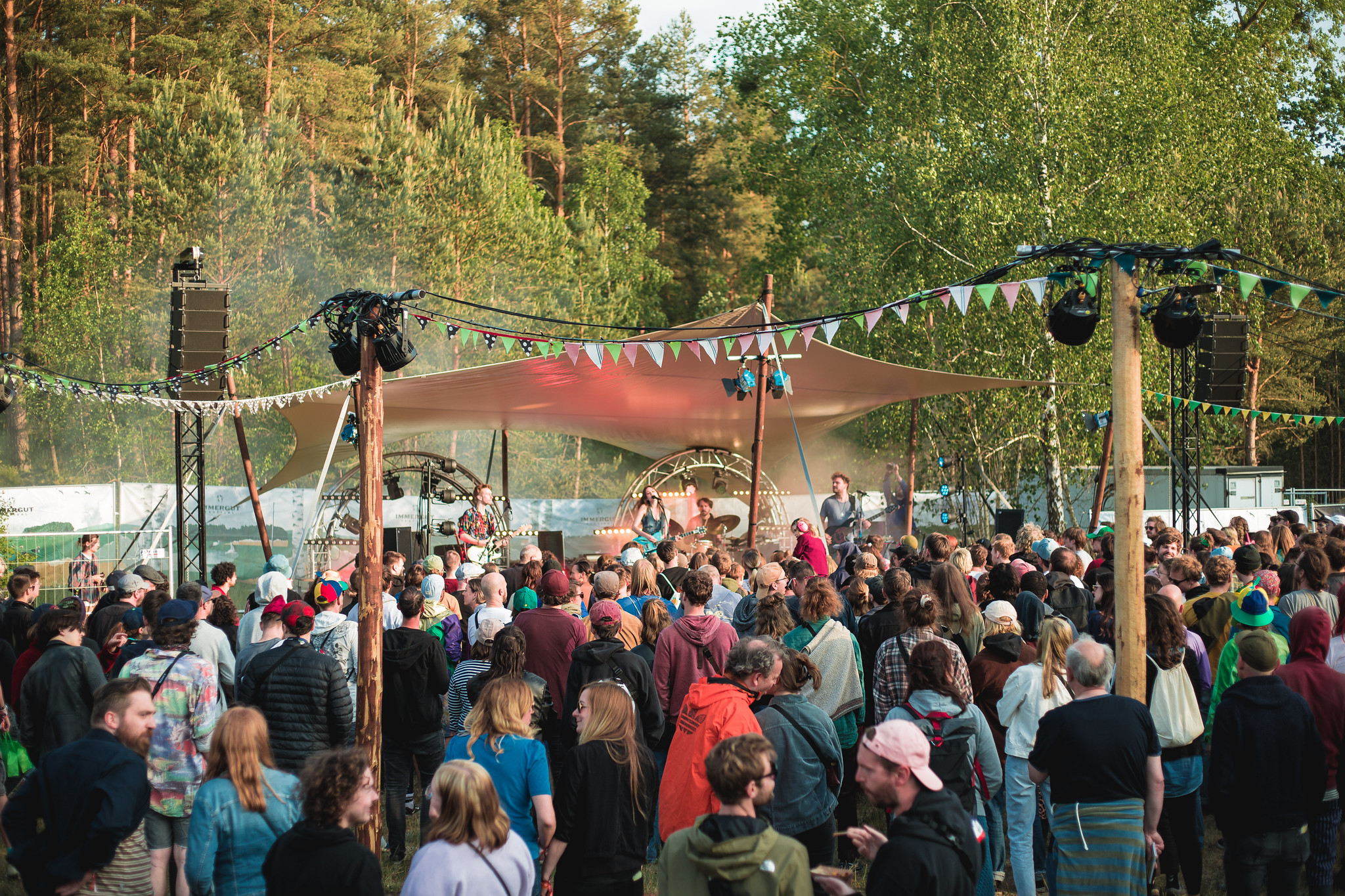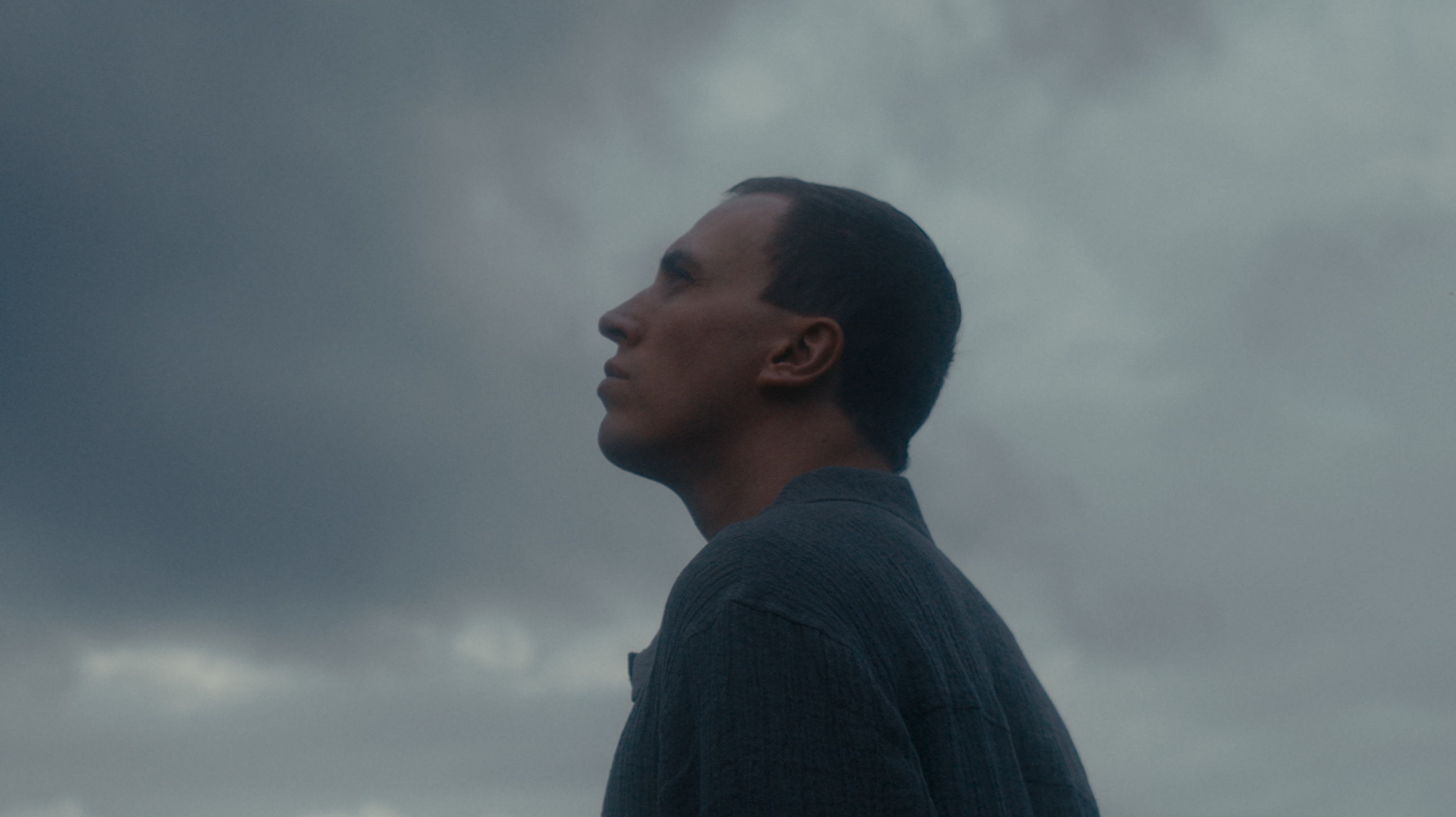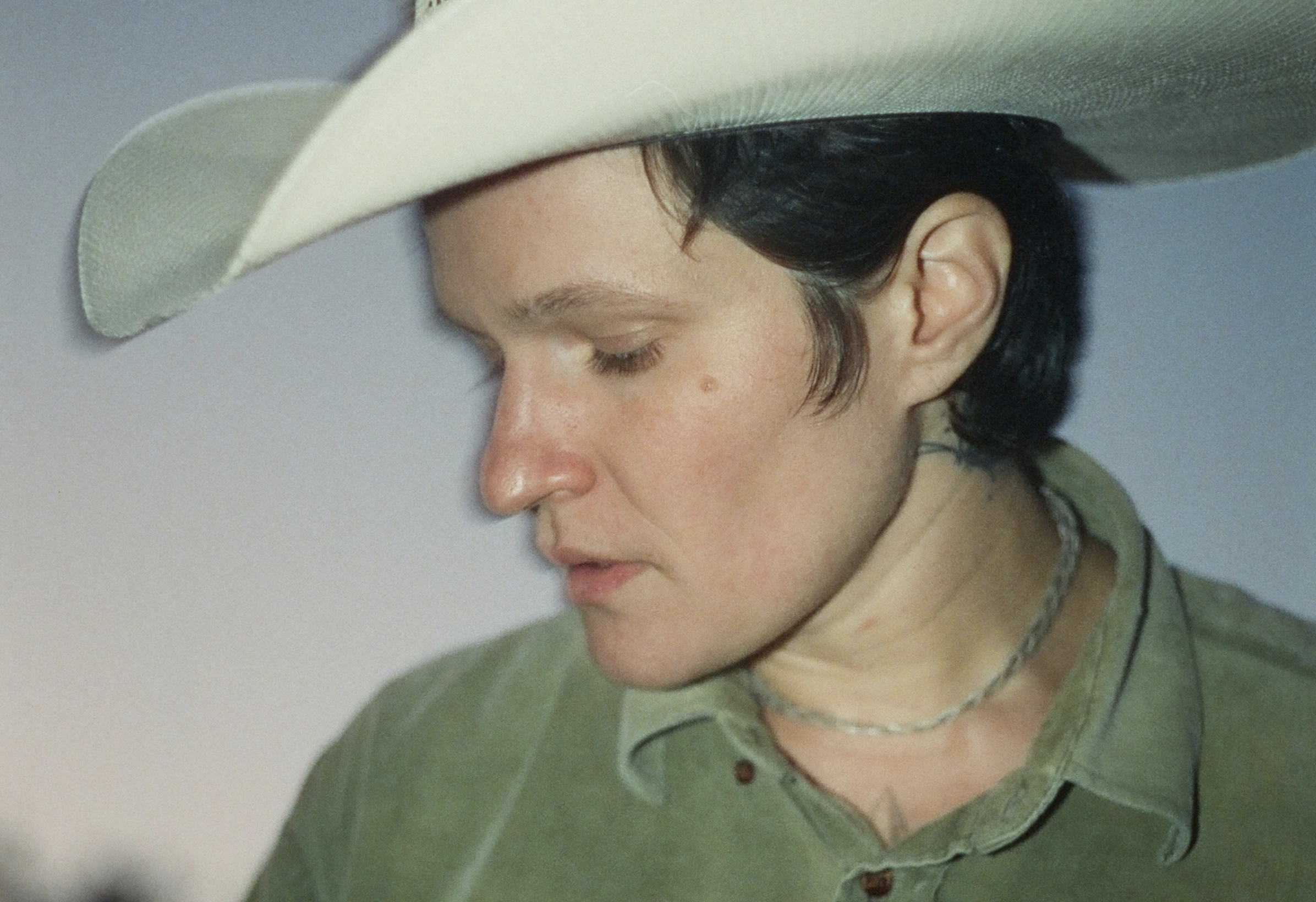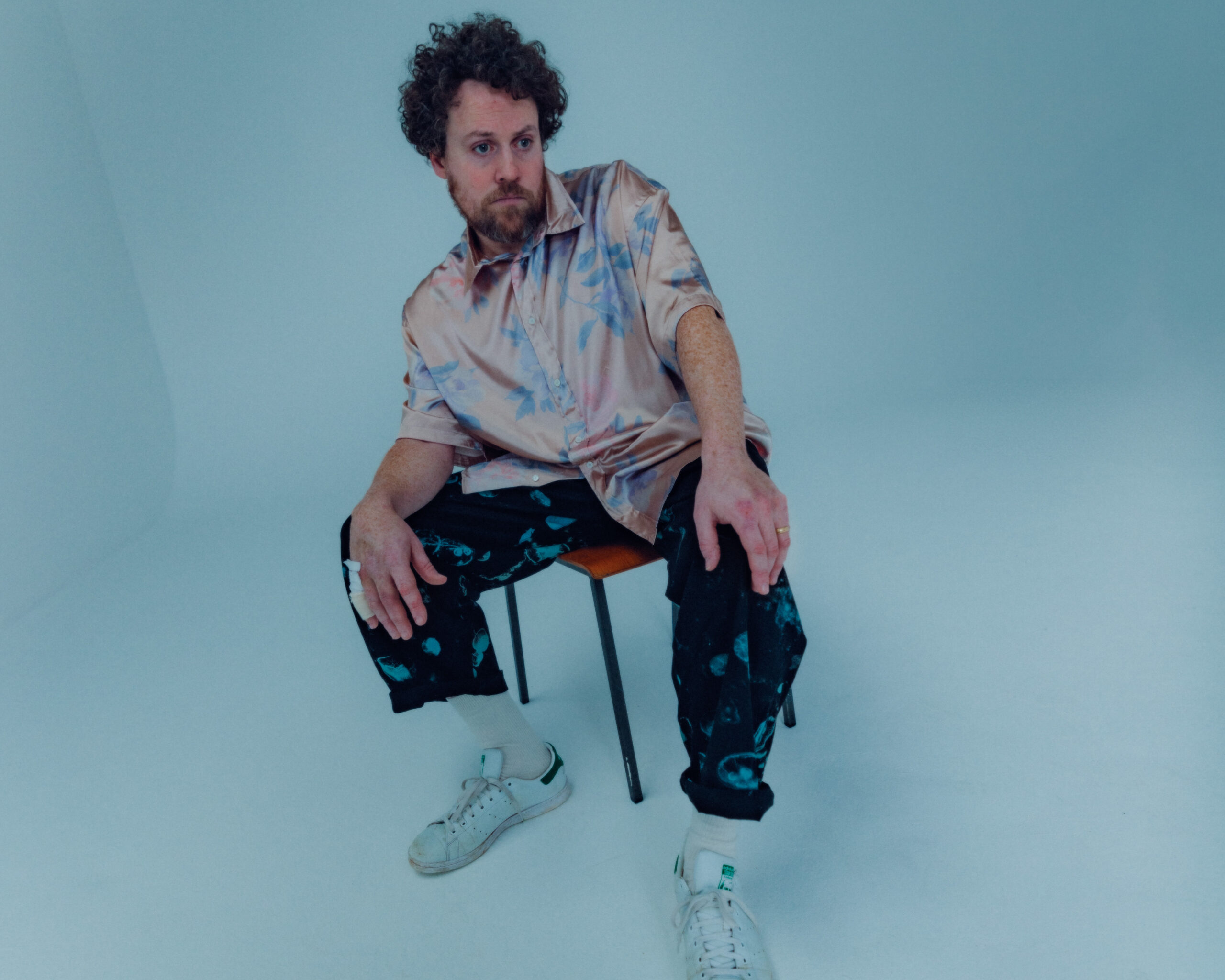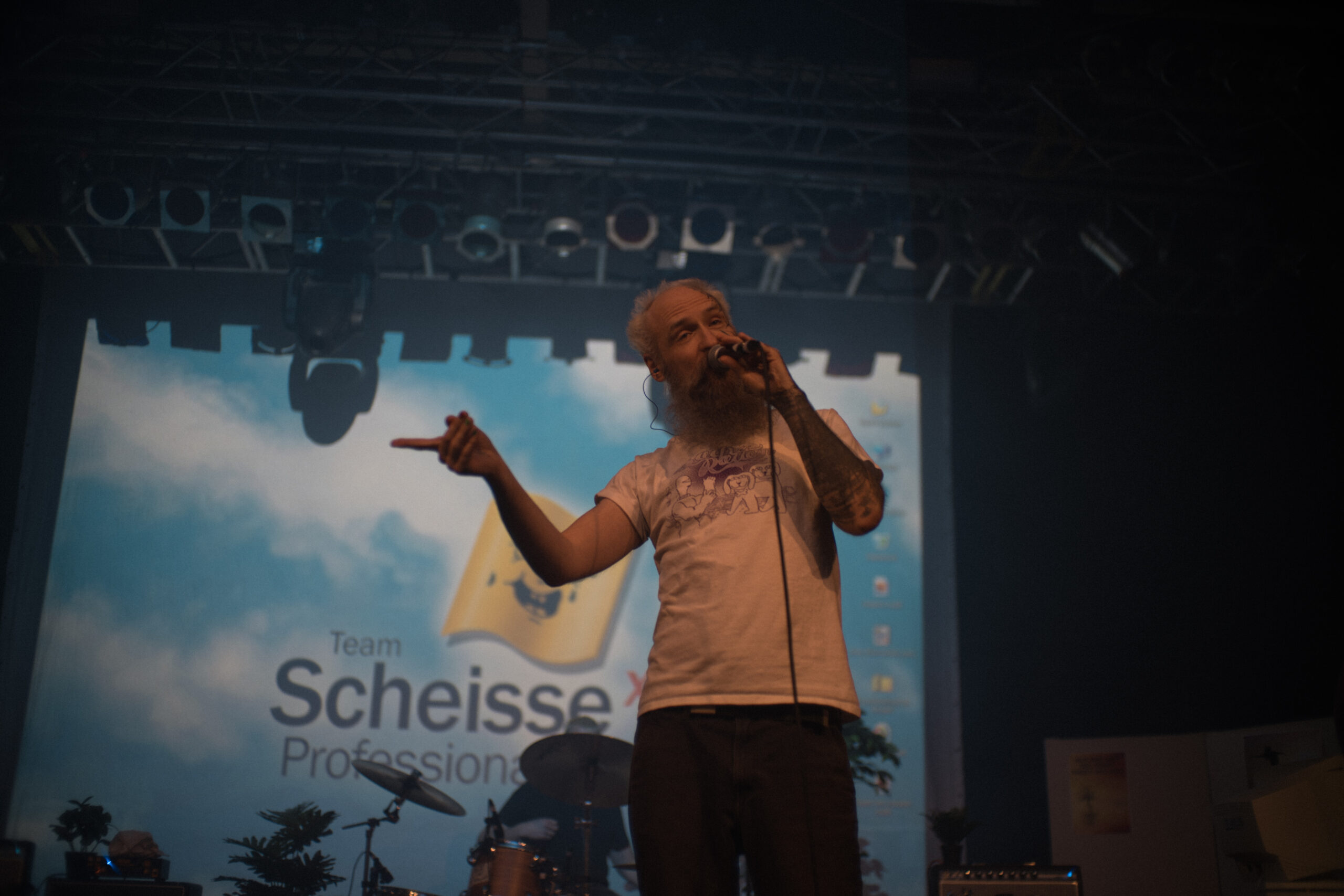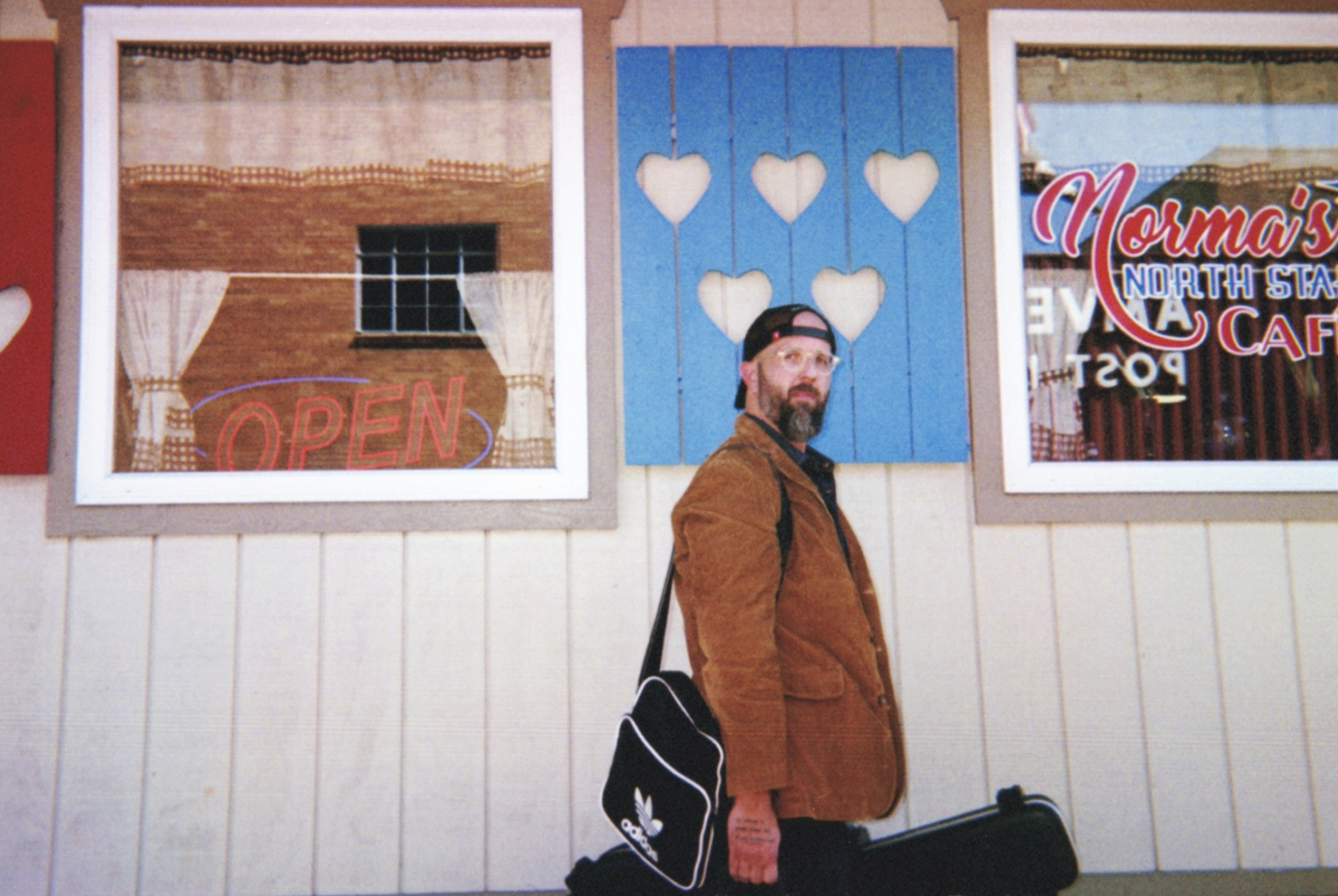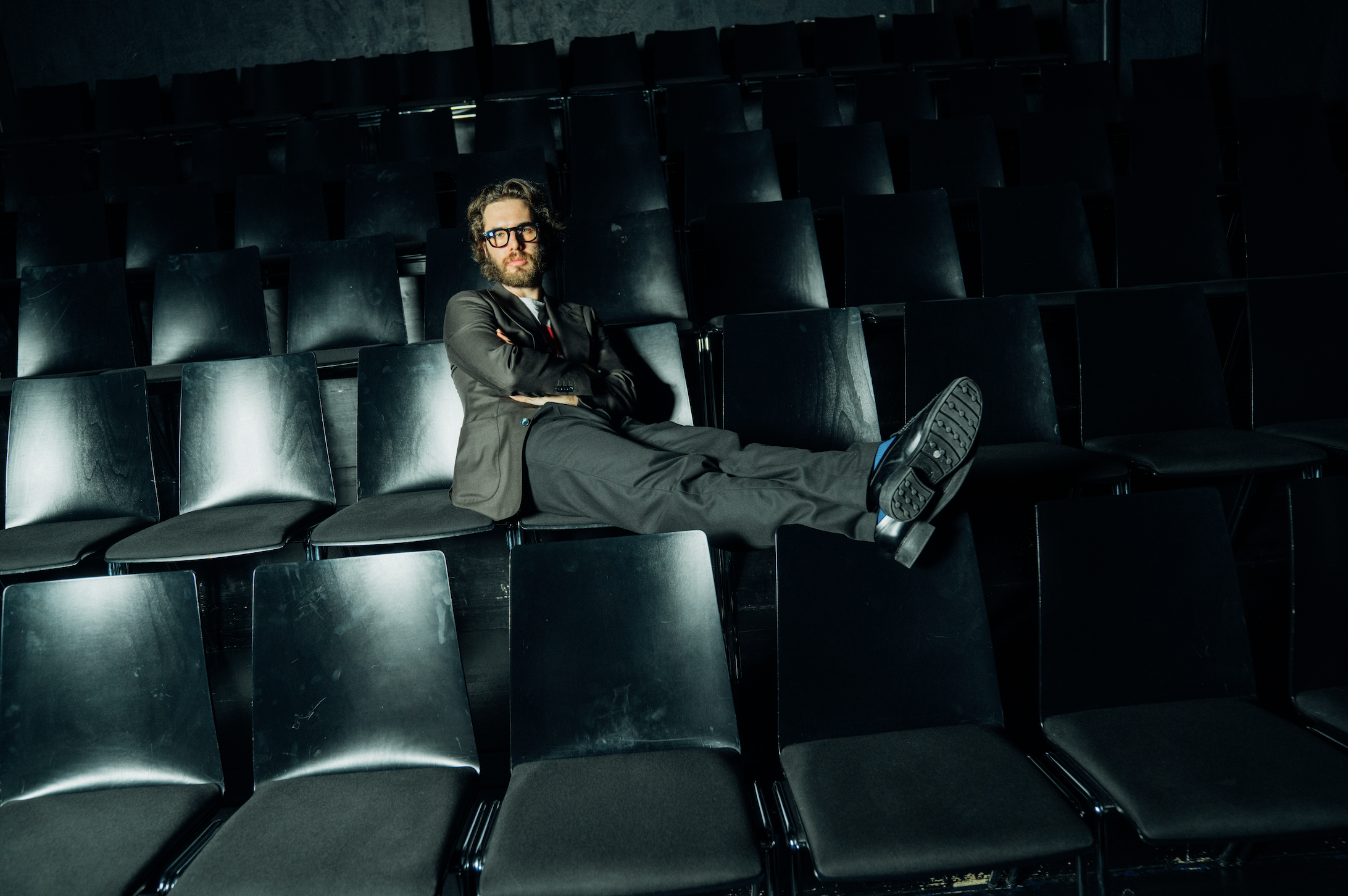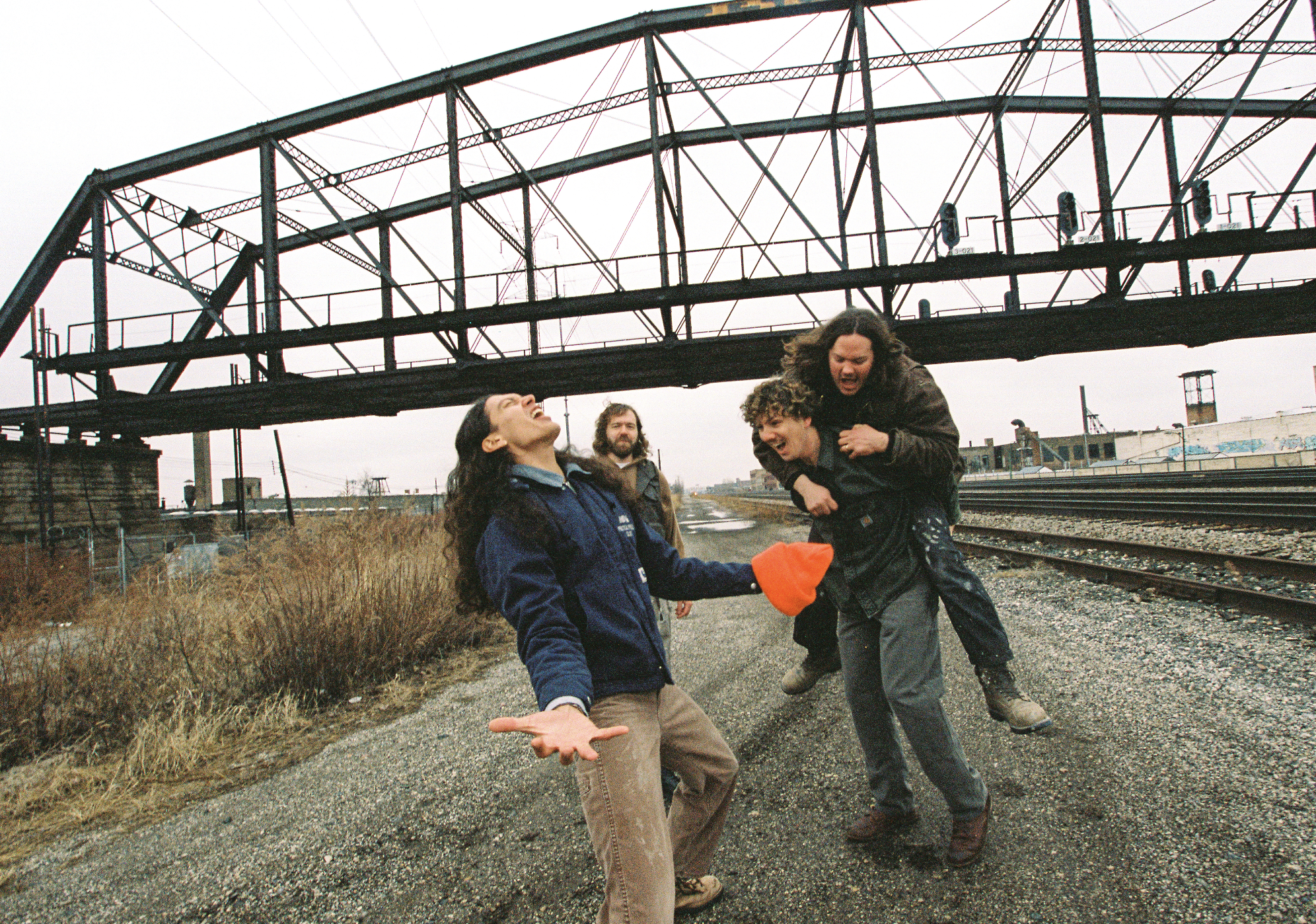HÆLOS haben sich im Londoner Nachtleben kennengelernt – und das hört man: euphorisch-ausbrechende Gesänge und treibende Beats auf der einen Seite, düstere Lyrics und wabernd-dunkle Klängen auf der anderen. Den Kontrast aus dem schattenhaften und gleichzeitig drängenden Sound von HÆLOS umschreibt das Trio mit der Genre-Bezeichnung „dark euphoria“ – konventionellere Ansätze sähen ihre Musik wohl als eine Mischung aus Indie-Electronic und Trip-Hop und atmosphärischen Soul-Elementen. Auf einigen Showcase Festivals konnten sie mit ihren urbanen Klanglandschaften schon überzeugen, am 18. März erscheint nun ihr Debütalbum ‘Full Circle‘. Wir hatten das Glück Arthur Delaney, Dom Goldsmith und Lotti Benardout, auf ihrem kurzen Zwischenstopp in Berlin kennenzulernen und mit ihnen über den Ursprung ihres Sounds zwischen Dunkelheit und Euphorie, ihr Image und über die Vervollständigung ihres persönlichen „Full Circles“ als Band zu sprechen.
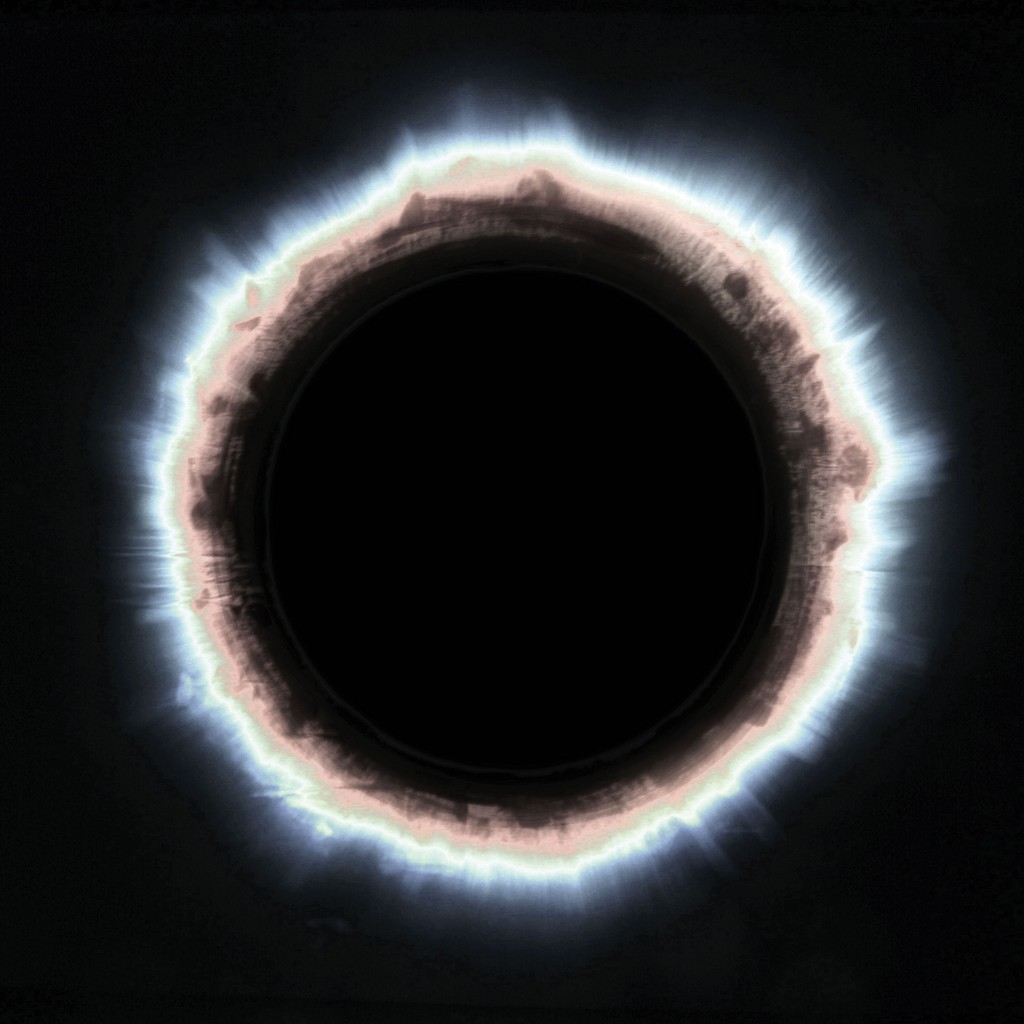
Since you’re debut will be released soon, I thought I’d start with quite an obvious question about the title: ‘Full Circle’ really sounds like there is a certain message behind. Why did you choose that name and what does it stand for?
Dom: The theme refers to the circular nature of life – you feel good, you feel bad, you feel high, you feel low – and it all comes down to the fact that everything is constantly spinning and evolving around the world.
Arthur: We wrote that song [it is also a song title] quite early in the process and then thought “Oh that is quite a cool album name”, but we didn’t think about it until we were coming to the end. This title sums up the whole theme – when you’re feeling emotions, they come up in waves and go away… Even within your own lifetime you are experiencing periods that are coming back to you and then you’re thinking “Oh maybe I’ve been here before or maybe I see it for the first time“.
So the meaning is more abstract than personal?
Lotti: Yes, I think it’s more general.
Dom: But you can take it literally, because it represents our band name as well – HÆLOS – you can’t think of that name as just one-dimensional.
I read that you had to catalyze a lot before you could start as a band and that this process is one part of your story. Could that be connected to the album title as well?
Lotti: Well, everything we’ve done from now leaded us to where we are.
Arthur: I think – to talk metaphorically – it is a bit like with a comet. When you feel alive you have a lot of energy and heat. You are travelling between different projects and suddenly you feel like your life is full of energy again, you feel driven by something that is greater than yourself. And you feel inspired to work really hard and do things and say something.
Dom: It feels like we’re at home now. Metaphorically.
You did your own projects and then got together as a band. How do you work together?
Lotti: I think we work as a collective. It is not like “we pass things around and you can take your part home with you to work on it”. We do most of the work together and it is a collective process. It is not necessarily a straight, linear process where you create a beat, and then a chord, a melody and then the lyrics…It is not like “the song is written on the piano, then it’s taken to the production”, it is very much sort of all at once.
Dom: Yeah, it’s a constant process and we are building our songs until all of us are happy, because there might be a point where one of us is happy or even two, but we don’t finish until we’re all happy and can say “yeah, it’s working”. Every time we’re collaborating the whole way through.
I think you can also hear that in the sound – when both of you sing together…
Lotti: Yeah, the sound as our common connection kind of forms the shape of the album.
Dom: It is about putting down our individual egos as well. We constantly keep it as a collective and share our skills with each other. And that has been rewarded in the process.
Arthur: Yeah, I think what Dom just said is the most enjoyable part of the process. I think that we’ve all arrived in this project. We think that we felt we were reaching individually aspects of the songwriting discipline, but together we were really reaching our peak. We got to that level where we really can say “Okay, we really got to do this, it is time to actively use these skills that we got.” And I think for me the most enjoyable part has been to use those skills and go even further by working with other people. For example with the lyrics I wrote: There are amazing parts that Lotti has brought to that table. That really helped me to improve. Also Lottis melodies have been really inspiring. So the process is very fluid and very creative.
And very democratic.
Dom: Yeah, very democratic.
When your music is described, the mysterious term “dark euphoria” comes up quite often. What exactly do you mean by this? Can you explain the origin of that genre-labeling?
Dom: It is actually a friend in England who coined it and it’s been used frequently since then. When you describe our music like that – we just thought it is fitting. Because our music is kind of both: It is “English melancholy” – that feeling when you’re leaving the club and the jacket you wore in the club was way too hot, but as soon as you go out the club you’re fucking freezing. Because the jacket is too thin and too hot – it is both. Are you with me? (Lotti & Arthur laugh & agree)
Lotti: I think it is about the dark and light and that mixture, that balance in-between. In our music there is a release in it, but there is also quite a tension.
To me, the lyrics often seem much darker than the sound.
Lotti: Yeah, sometimes.
Arthur: I think that the music is also pretty fucked up and quite intense, not pop-song-like-music…
Dom: It is also about creating attention through the dichotomy between two things, not being in just one emotion, but being torn between two.
Arthur: To be honest, I think that’s the problem with a lot of music: That it’s often very one-dimensional. Often it is either this thing or that thing, but I think being human isn’t really like that; it’s much more complex than that. You can feel really good and really bad both at the same time. Unification feels a lot better than division.
And you’re quite safe by calling your music “dark” and “euphoric” at the same time and combining these oppositions – you can do whatever you want with that!
Lotti: Yeah, that is kind of our approach. Not purposely, but when the chord sounds happy, we naturally put something a little moodier against it – to balance it out.
You have quite a distinct image, I think. I don’t know if you see it as an image, but it was created especially at the beginning – when you appeared without any information and set the basis for the kind of mysterious aura that surrounds you. Was that a though-out concept or did it just happen accidentally because you we’re surprised by the sudden success of your songs?
Dom: No no. I think naturally, if you release any new music today, the first thing writers would say is “oh, mysterious!” But it is normal for a lot of new bands to not have a lot of information accessible at the beginning.
Arthur: And the internet is so full with information, so people crave mystery
But still – that mysterious touch fits quite well to your appearance.
Lotti: Well, we didn’t know what was going to happen, there was no intention. We hoped that people would listen to it and like it and people would connect to it, but we had no real master plan. We put it online and it went viral from there. And I think it worked well for us like that, because for all of us our music is about the music, it is not necessarily about any one of us being in front of it, you know. It is not really about us, it is more about putting the music first. So in that sense not having lots of information on display was perfect for us.
Dom: At the time when we released the first track we didn’t have a press text, only a picture. And the way we were in it together, almost made it look like we were in a womb. It looked like an ultrasound of us, and that characterized quite well where the project was at the time because there were different stages. We’ve never really hidden anything, as soon as we have something to share – we share it.
Arthur: The point is, people have gotten so used to artists just giving everything; that to me is very much to avoid. I don’t think it’s a reflection of being human, it is sort of boundary-less. And to be a strong individual you have to know your own boundaries, where you can say “we only give you this” or “that’s all you can have”. I think the thing about that early photo is that actually that photo still feels like it would fit right now. Because there was some magic happening at the beginning of this band and I don’t know what it was, but it made something bigger out of us.
The things you show, for example the pictures on Facebook or Instagram, they seem very much thought through – like there was a concept behind it. It always seems quite dark, black & white and distant…
Arthur: I think, for example at Instagram, we try to visually represent how our music feels like to listen to.
Dom: You build a house, and the way it is decorated, that reflects your personality. And if you look at our Instagram, press shots, videos – that is the decoration in our house.
Lotti: And I think we also want to keep it quite distant in a way, you know.
Your live performances also seem quite strong visually, since Lotti and Arthur are both standing at the front of the stage, which is an interesting contrast to the “lonely frontman/-woman concept”. Do you have other, more explicit visual concepts for the upcoming tour?
Arthur: At the moment we’re trying to basically make sure that we’ve got our full band. But I feel like we’ve been trying as much as possible to make that happen, because what we love about doing live with this record is that every night it is a different performance.
Dom: We’re reimagining the record live all the time and we hope that sometime we can collaborate with someone on a visual level and have a much bigger production. But equally we love playing and making it feel like it’s someone’s front room and having that intimacy.
So is there a plan to play in Germany anytime soon?
Lotti: We were talking about this earlier and hopefully soon! We want to come back, we’ve only done two shows so far, both in Hamburg where we had a lot of fun.
Dom: We are not sure when – but we’re looking forward to it.
Is there anything else you’re really looking forward to at the moment?
Lotti: We’re playing at SXSW and then we’re going to Coachella and then there will be a U.S. tour, we’re looking forward to that. And then hopefully come back and tour Europe.
So you’re happy to be touring a lot.
Lotti: Yeah, cause in the studio you’re pretty much all the time in one space.
Dom: Yes, we were there for 24/7, that has been quite intense, but it hasn’t felt like work. We’re quite privileged to be doing something we love, but it is really nice to be able to go touring, and then probably in a year we’ll be sick of touring and finish the second album. So it is about that circle-thing again.
Arthur: Another good thing about being a musician is that it’s almost like having two different jobs. You have one job for a while, then you take a break from it – you have another job for a while. And when we’ll arrive back at the studio we’ll be really hungry to write, I think.
Lotti: Yes, with a whole new world of experiences as a background.
‘Full Circle’ erscheint am 18. März 2016 via Matador Records.

